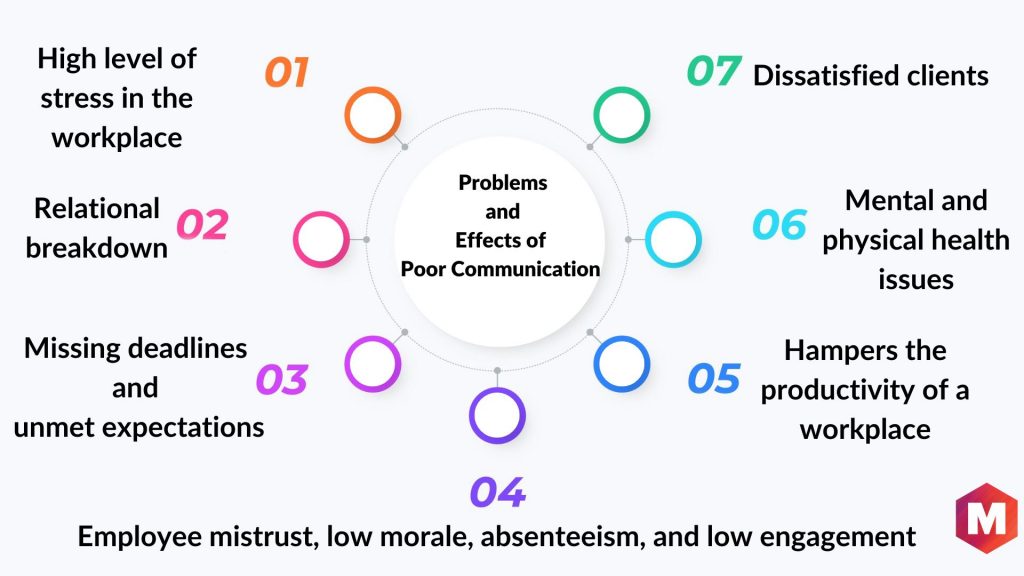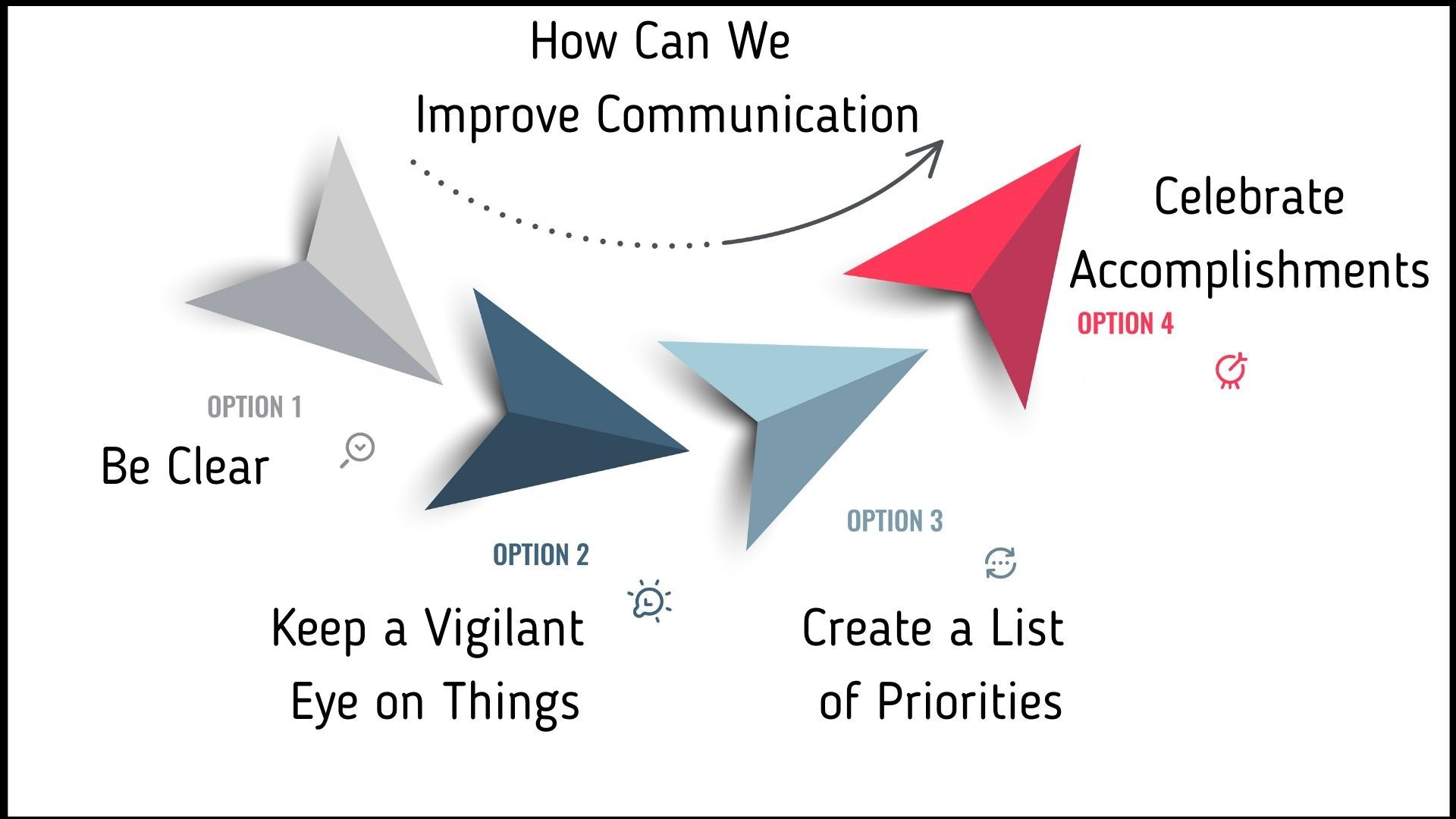
What are the Consequences of Ineffective Communication in the Workplace?

Discover the detrimental effects of poor communication in the workplace From high levels of stress to dissatisfied clients, learn how to improve communication to foster solid relationships, boost productivity, and enhance mental and physical health
Effective communication is vital for any workplace to function smoothly and achieve its business objectives. When communication is open and information flows freely, it fosters strong relationships that enable an organization to grow and prosper. On the other hand, poor communication skills can lead to chronic dissatisfaction in the workplace, which can adversely affect the overall productivity and success of a business entity.
What is Poor Communication in the Workplace?
Ineffective team communication in the workplace refers to a scenario where employees, managers, and colleagues fail to communicate efficiently, leading to a breakdown in relationship building and productivity. Several factors can contribute to poor communication, including lack of trust, respect, and insufficient communication skills. Typically, a breakdown in relationship building among employees or colleagues is the root cause of inadequate communication, leading to workplace concerns such as employees feeling unheard or disrespected by their managers or colleagues, causing them to become defensive while communicating with others.
Employees and managers with poor listening skills can contribute to miscommunication, leading to misunderstandings about expectations and projects. This can result in negative feelings among coworkers, ultimately leading to lower morale and decreased productivity in the office environment.
Problems and Effects of Poor Communication
The employees may not have their rights reserved in such a place. Some of the problems and effects of poor communication are as follows-
1. High level of stress in the workplace
Poor or ineffective communication within the workplace can have a significant impact on stress levels. When employees are unable to effectively communicate their thoughts and ideas to one another, a sense of urgency can arise, creating a tense environment where everything feels urgent and is added to the to-do list. This pervasive feeling of panic can lead to misunderstandings, heightened tension, and increased stress levels, leaving employees feeling overworked and resulting in lower morale. This stress can also lead to other related issues such as depression, anxiety, and burn-out, which can have negative consequences for both the individual and the workplace as a whole. Therefore, it is important to recognize the potential harmful effects of poor communication in the workplace and take steps to improve it.
2. Relational breakdown
Ineffective communication within a workplace can result in damaged relationships. If stress, anger, and misunderstandings are present in a work environment, it's likely that employees will experience feelings of frustration and helplessness.
There will be a pervasive sense of accusation and uncertainty, accompanied by raised voices and heated arguments. This will create a fear among employees that they are not working up to their full potential. As a result, confidence will wane and staff relations will suffer, hitting an all-time low in the workplace.
3. Missing deadlines and unmet expectations
Unclear roles and responsibilities, coupled with a lack of understanding and communication among employees, can lead to disastrous consequences. Important information may not be effectively communicated, resulting in missed deadlines and unmet expectations for projects.
4. Employee mistrust, low morale, absenteeism, and low engagement
Poor communication in the workplace can have a significant impact on employees' confidence levels, causing them to doubt both their own abilities and the capabilities of their organization. This can lead to negative emotions, such as low morale and mistrust, which can further exacerbate communication breakdowns.
5. Hampers the productivity of a workplace
Instead of feeling energized to start the day, many employees now view the end of their shift as a much-needed relief. This is often due to a toxic work environment characterized by despair and poor communication, which can lead to low employee engagement and high rates of absenteeism.Poor communication skills in the workplace can have a significant impact on an individual's ability to effectively work and collaborate with their team members and clients. When communication is hindered, it can be challenging to share valuable information and ideas, ultimately resulting in a decrease in productivity within the organization. This can lead to difficulties in completing projects and negatively affect the overall success of the business.
6. Mental and physical health issues
When employees are unable to unleash their full potential, a sense of doubt may start creeping in. As a result, job security and survival in the company become the primary concerns, overshadowing efficiency and productivity.
The impact of poor workplace communication can be devastating on an individual's mental health. When faced with challenges and obstacles, it's common to feel afraid, helpless, and concerned. However, without the necessary emotional support and self-care, these negative feelings can quickly escalate into more serious mental health issues. In fact, studies have shown that workplace communication problems are often linked to a decline in an individual's overall health and well-being.
7. Dissatisfied clients
Inadequate communication can result in incomplete projects, unmet deadlines, disgruntled management, and dissatisfied customers. As a consequence, clients may lose confidence in the company and seek alternatives.
It is unfair for companies to hold their clients accountable if their employees are at fault. This can lead to frustration and dissatisfaction among leaders, making it difficult for them to effectively manage client relationships.
The Importance of Effective Workplace Communication
Successful businesses rely heavily on effective communication in the workplace, as it is the cornerstone of all aspects of the business, from employee satisfaction to customer service and overall success.
Effective communication is vital to the success of any organization. Poor communication can lead to missed opportunities and misunderstandings. When employees are not communicating effectively, it can result in inefficient processes and ultimately impact customer satisfaction levels. To avoid these issues, it is important to identify and address the root causes of poor communication in the workplace.
Examples of Poor Communication in the Workplace
There are many examples of poor communication in the workplace.
1. Project Assignment
The assigned task can be overwhelming for an employee who lacks the necessary skills or knowledge to complete it. Despite this, some employees hesitate to seek help or clarification from their colleagues or superiors, which can lead to incomplete or subpar work.
2. Manager
The lack of clear instructions and deadlines provided by the manager to their employee regarding the project creates confusion and uncertainty, potentially leading to delays or subpar results.
3. Between Employees
4. Between Manager and Employee
Lack of communication between employees working on a project can lead to obstacles in completing the project successfully. For instance, if one employee requires data from another department, but fails to communicate this need, it can result in delays and inefficiencies.A manager is supposed to discuss an employee’s performance with them, but they don’t explain what the employee should be doing differently or better.
5. Communication within the Team
Causes of Poor Communication in the Workplace
: There seems to be a lack of communication within the team regarding the objectives of their respective projects and tasks. As a result, each team member works independently without consulting or discussing their assignments with others beforehand.Poor communication can be caused by a number of factors in the workplace to avoid workplace conflict. Here are some of the most common causes of internal communications:
Lack of Training or Education
If employees lack effective communication skills, they may struggle to convey ideas to their coworkers in a clear and concise manner. This can result in misunderstandings that can negatively impact interpersonal relationships in the workplace.
Lack of Emotional Intelligence
It is crucial for employees to be at ease with their own emotions and challenges in order to competently handle the emotions of others. When emotions run high, it is imperative for coworkers and managers to create an environment where everyone feels safe to express themselves without the fear of being judged or retaliated against by management. This can be achieved by giving each other space.
How Can We Improve Communication?
1. Be clear
can include implementing regular team meetings, setting up a communication feedback system, and providing communication training for employees at all levels. By investing in these initiatives, companies can create a culture of open communication where employees feel valued and heard, leading to increased productivity and job satisfaction. It is crucial for businesses to recognize the impact of poor communication and take action to improve it for the benefit of their organization and employees.Clearly communicating expectations during business meetings is vital for effective communication. This can be achieved by defining job descriptions, roles, and responsibilities of employees. Additionally, sending detailed project requirements via email can also help ensure clear understanding and successful outcomes.
2. Keep a vigilant eye on things
Proper communication is not just about sending out instructions, it also requires active monitoring of employees' progress and addressing their concerns. Superiors should regularly check in with their staff, ask questions, and actively listen to their feedback. Encouraging open communication and offering support when needed can help ensure that employees are able to meet the demands of the organization.
3. Create a list of priorities
Create a prioritized list of essential communication skills in the workplace to ensure effective and efficient operations. Ensure all employees are informed and up-to-date with relevant information to fulfill organizational obligations.
4. Celebrate accomplishments
Celebrating the successes and advancements of team members fosters a positive and thriving corporate environment. The key to achieving this lies in proficient communication abilities, which can lead to a growth-oriented mentality and a brighter future for any business organization.
Final Words!
Effective communication is crucial for the success of any business, and inadequate communication can have detrimental effects. However, identifying and addressing the root cause of poor communication can be a daunting task for business leaders. Nevertheless, there are strategies that can be implemented to ensure that the intended message is received by employees, ultimately leading to successful outcomes.
PREV
Email Etiquettes
START
Types of Communication
















